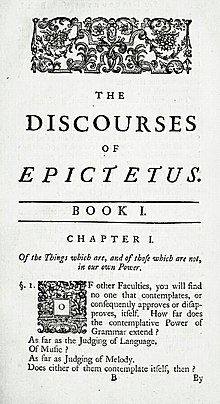 Elizabeth Carter translation, 1759 | |
| Author | Epictetus |
|---|---|
| Original title | The Discourses of Epictetus |
| Language | Koine Greek |
| Genre | Philosophy |
Publication date | 2nd century |
| Publication place | Greece |
| Text | Discourses at Wikisource |
The Discourses of Epictetus (Greek: Ἐπικτήτου διατριβαί, Epiktētou diatribai) are a series of informal lectures by the Stoic philosopher Epictetus written down by his pupil Arrian around 108 AD. Four books out of an original eight are still extant. The philosophy of Epictetus is intensely practical. He directs his students to focus attention on their opinions, anxieties, passions, and desires, so that "they may never fail to get what they desire, nor fall into what they avoid." True education lies in learning to distinguish what is our own from what does not belong to us, and in learning to correctly assent or dissent to external impressions. The purpose of his teaching was to make people free and happy.
The Discourses have been influential since they were written. They are referred to and quoted by Marcus Aurelius. Since the 16th century, they have been translated into multiple languages and reprinted many times.